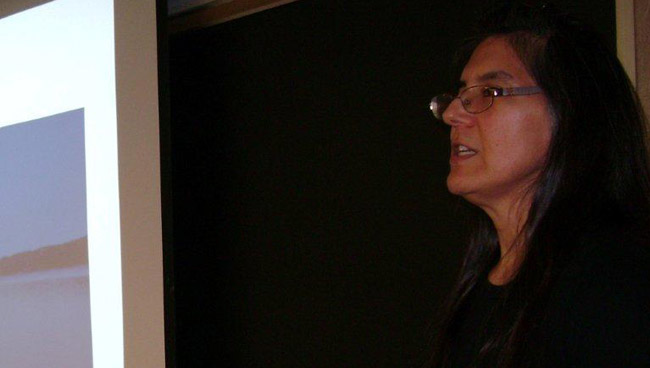Treating water like a relative

By Barb Nahwegahbow
TORONTO – Dr. Deb McGregor takes her traditional responsibilities to water very seriously.
A citizen of Whitefish River First Nation, McGregor is Associate Professor, Department of Geography and Planning at the University of Toronto where she spoke on Dec. 4 about her research into Anishinaabe knowledge as it relates to water.
She began with an illustration of the teachings she’s received from Elders to remember her place in Creation and her responsibilities when she’s conducting research. Using slides, she introduced her family, her community, her territory and her nation.
“I think about doing this kind of work with an ethical Indigenous approach,” McGregor said. “It’s recognizing the people around you, the political, social, economic and cultural, but also the land itself. It’s how you frame your work.”
It’s also important to recognize your teachers, the source of your knowledge, she noted, and not just academic teachers. The late Robin Greene from the Treaty 3 area was an influential teacher for her, as is Josephine Mandamin, who started the Mother Earth Water Walk in 2003.
“She knows the state of the Great Lakes probably better than anybody,” McGregor said of the Wikwemikong Elder who has walked the circumference of all five Great Lakes.
Indigenous people have a much more wholistic view of water, McGregor said, one that goes beyond just safe drinking water. They are concerned about the water as a spiritual and physical entity within Creation, as the lifeblood of Mother Earth. They worry about the fish and the wildlife and medicines that depend on the water for life. In turn, she said, we depend on fish and wildlife for food, and medicines for healing. It’s critical, she said, that we question whether we are interfering with water’s ability to fulfill its duties and responsibilities to give life. All waters need to be protected, she was told by Elders and traditional Knowledge Keepers, not just drinking water.
One of the things that came out of her research, she said, is that First Nations people treat water as a relative. “That’s how Josephine looks at the Great Lakes,” McGregor said. “They all have a personality.” She recalled a workshop she attended in 2007 where Ed Metatawabin, former Chief of Fort Albany, put out a glass of water and addressed it as a relative. “That’s a very different way of relating to water than thinking about it as a commodity,” she said.
“Traditional knowledge is very important in terms of making decisions about water,” McGregor said. “The spiritual, cultural, traditional element is really important for how you think about water, how you govern and how you understand your relationships and responsibilities.” The Elders have said, “there’s going to be consequences for everybody…and if we don’t sort it out, everybody’s going to be affected if we don’t respect water.”


